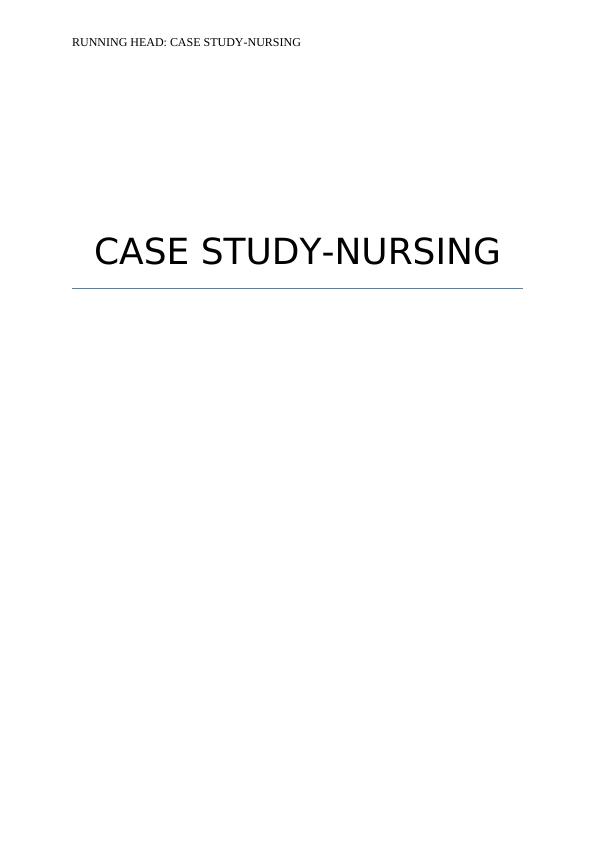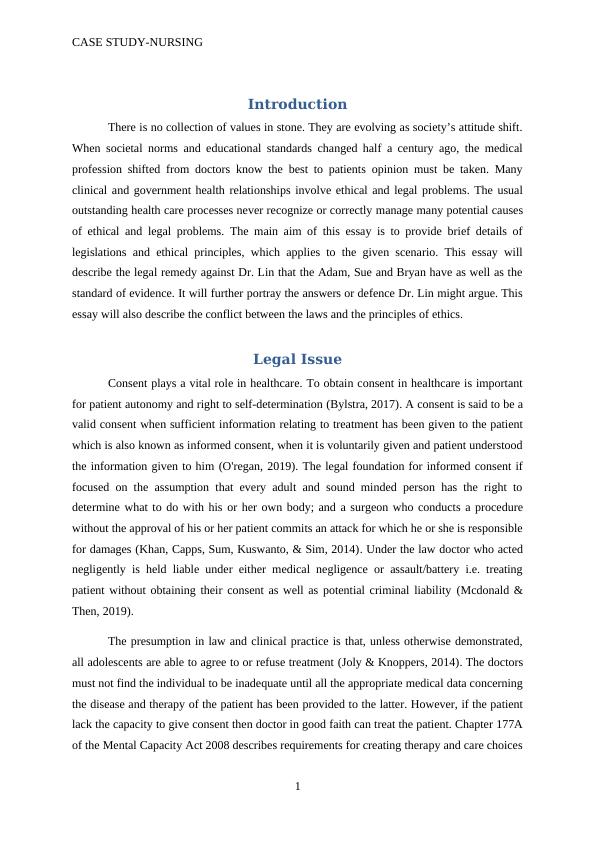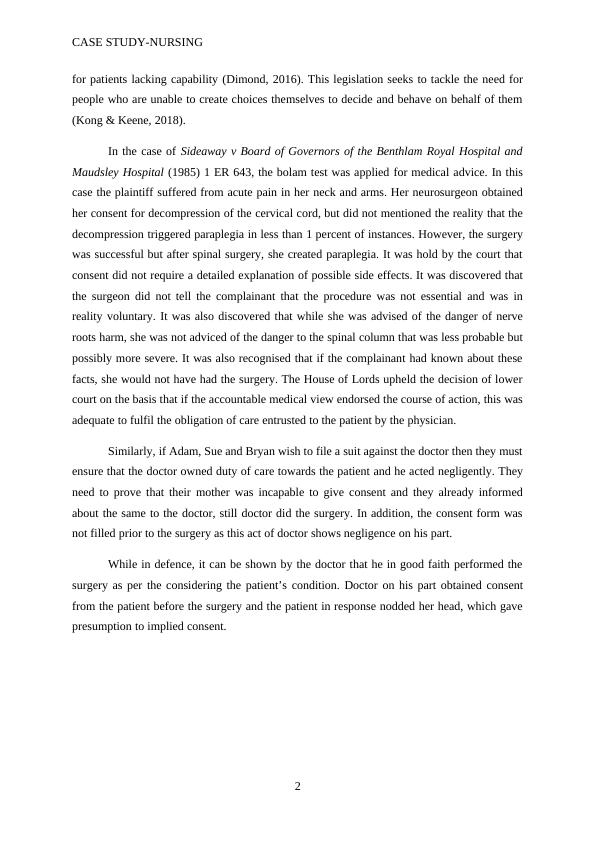Legal and Ethical Issues in Healthcare: A Case Study in Nursing
Added on 2022-11-13
7 Pages2028 Words421 Views
RUNNING HEAD: CASE STUDY-NURSING
CASE STUDY-NURSING
CASE STUDY-NURSING

CASE STUDY-NURSING
Introduction
There is no collection of values in stone. They are evolving as society’s attitude shift.
When societal norms and educational standards changed half a century ago, the medical
profession shifted from doctors know the best to patients opinion must be taken. Many
clinical and government health relationships involve ethical and legal problems. The usual
outstanding health care processes never recognize or correctly manage many potential causes
of ethical and legal problems. The main aim of this essay is to provide brief details of
legislations and ethical principles, which applies to the given scenario. This essay will
describe the legal remedy against Dr. Lin that the Adam, Sue and Bryan have as well as the
standard of evidence. It will further portray the answers or defence Dr. Lin might argue. This
essay will also describe the conflict between the laws and the principles of ethics.
Legal Issue
Consent plays a vital role in healthcare. To obtain consent in healthcare is important
for patient autonomy and right to self-determination (Bylstra, 2017). A consent is said to be a
valid consent when sufficient information relating to treatment has been given to the patient
which is also known as informed consent, when it is voluntarily given and patient understood
the information given to him (O'regan, 2019). The legal foundation for informed consent if
focused on the assumption that every adult and sound minded person has the right to
determine what to do with his or her own body; and a surgeon who conducts a procedure
without the approval of his or her patient commits an attack for which he or she is responsible
for damages (Khan, Capps, Sum, Kuswanto, & Sim, 2014). Under the law doctor who acted
negligently is held liable under either medical negligence or assault/battery i.e. treating
patient without obtaining their consent as well as potential criminal liability (Mcdonald &
Then, 2019).
The presumption in law and clinical practice is that, unless otherwise demonstrated,
all adolescents are able to agree to or refuse treatment (Joly & Knoppers, 2014). The doctors
must not find the individual to be inadequate until all the appropriate medical data concerning
the disease and therapy of the patient has been provided to the latter. However, if the patient
lack the capacity to give consent then doctor in good faith can treat the patient. Chapter 177A
of the Mental Capacity Act 2008 describes requirements for creating therapy and care choices
1
Introduction
There is no collection of values in stone. They are evolving as society’s attitude shift.
When societal norms and educational standards changed half a century ago, the medical
profession shifted from doctors know the best to patients opinion must be taken. Many
clinical and government health relationships involve ethical and legal problems. The usual
outstanding health care processes never recognize or correctly manage many potential causes
of ethical and legal problems. The main aim of this essay is to provide brief details of
legislations and ethical principles, which applies to the given scenario. This essay will
describe the legal remedy against Dr. Lin that the Adam, Sue and Bryan have as well as the
standard of evidence. It will further portray the answers or defence Dr. Lin might argue. This
essay will also describe the conflict between the laws and the principles of ethics.
Legal Issue
Consent plays a vital role in healthcare. To obtain consent in healthcare is important
for patient autonomy and right to self-determination (Bylstra, 2017). A consent is said to be a
valid consent when sufficient information relating to treatment has been given to the patient
which is also known as informed consent, when it is voluntarily given and patient understood
the information given to him (O'regan, 2019). The legal foundation for informed consent if
focused on the assumption that every adult and sound minded person has the right to
determine what to do with his or her own body; and a surgeon who conducts a procedure
without the approval of his or her patient commits an attack for which he or she is responsible
for damages (Khan, Capps, Sum, Kuswanto, & Sim, 2014). Under the law doctor who acted
negligently is held liable under either medical negligence or assault/battery i.e. treating
patient without obtaining their consent as well as potential criminal liability (Mcdonald &
Then, 2019).
The presumption in law and clinical practice is that, unless otherwise demonstrated,
all adolescents are able to agree to or refuse treatment (Joly & Knoppers, 2014). The doctors
must not find the individual to be inadequate until all the appropriate medical data concerning
the disease and therapy of the patient has been provided to the latter. However, if the patient
lack the capacity to give consent then doctor in good faith can treat the patient. Chapter 177A
of the Mental Capacity Act 2008 describes requirements for creating therapy and care choices
1

CASE STUDY-NURSING
for patients lacking capability (Dimond, 2016). This legislation seeks to tackle the need for
people who are unable to create choices themselves to decide and behave on behalf of them
(Kong & Keene, 2018).
In the case of Sideaway v Board of Governors of the Benthlam Royal Hospital and
Maudsley Hospital (1985) 1 ER 643, the bolam test was applied for medical advice. In this
case the plaintiff suffered from acute pain in her neck and arms. Her neurosurgeon obtained
her consent for decompression of the cervical cord, but did not mentioned the reality that the
decompression triggered paraplegia in less than 1 percent of instances. However, the surgery
was successful but after spinal surgery, she created paraplegia. It was hold by the court that
consent did not require a detailed explanation of possible side effects. It was discovered that
the surgeon did not tell the complainant that the procedure was not essential and was in
reality voluntary. It was also discovered that while she was advised of the danger of nerve
roots harm, she was not adviced of the danger to the spinal column that was less probable but
possibly more severe. It was also recognised that if the complainant had known about these
facts, she would not have had the surgery. The House of Lords upheld the decision of lower
court on the basis that if the accountable medical view endorsed the course of action, this was
adequate to fulfil the obligation of care entrusted to the patient by the physician.
Similarly, if Adam, Sue and Bryan wish to file a suit against the doctor then they must
ensure that the doctor owned duty of care towards the patient and he acted negligently. They
need to prove that their mother was incapable to give consent and they already informed
about the same to the doctor, still doctor did the surgery. In addition, the consent form was
not filled prior to the surgery as this act of doctor shows negligence on his part.
While in defence, it can be shown by the doctor that he in good faith performed the
surgery as per the considering the patient’s condition. Doctor on his part obtained consent
from the patient before the surgery and the patient in response nodded her head, which gave
presumption to implied consent.
2
for patients lacking capability (Dimond, 2016). This legislation seeks to tackle the need for
people who are unable to create choices themselves to decide and behave on behalf of them
(Kong & Keene, 2018).
In the case of Sideaway v Board of Governors of the Benthlam Royal Hospital and
Maudsley Hospital (1985) 1 ER 643, the bolam test was applied for medical advice. In this
case the plaintiff suffered from acute pain in her neck and arms. Her neurosurgeon obtained
her consent for decompression of the cervical cord, but did not mentioned the reality that the
decompression triggered paraplegia in less than 1 percent of instances. However, the surgery
was successful but after spinal surgery, she created paraplegia. It was hold by the court that
consent did not require a detailed explanation of possible side effects. It was discovered that
the surgeon did not tell the complainant that the procedure was not essential and was in
reality voluntary. It was also discovered that while she was advised of the danger of nerve
roots harm, she was not adviced of the danger to the spinal column that was less probable but
possibly more severe. It was also recognised that if the complainant had known about these
facts, she would not have had the surgery. The House of Lords upheld the decision of lower
court on the basis that if the accountable medical view endorsed the course of action, this was
adequate to fulfil the obligation of care entrusted to the patient by the physician.
Similarly, if Adam, Sue and Bryan wish to file a suit against the doctor then they must
ensure that the doctor owned duty of care towards the patient and he acted negligently. They
need to prove that their mother was incapable to give consent and they already informed
about the same to the doctor, still doctor did the surgery. In addition, the consent form was
not filled prior to the surgery as this act of doctor shows negligence on his part.
While in defence, it can be shown by the doctor that he in good faith performed the
surgery as per the considering the patient’s condition. Doctor on his part obtained consent
from the patient before the surgery and the patient in response nodded her head, which gave
presumption to implied consent.
2

End of preview
Want to access all the pages? Upload your documents or become a member.
Related Documents
Health Law and Ethicslg...
|7
|2074
|4
Health Law and Ethics Essay 2022lg...
|6
|2136
|69
Identification of Ethical and Legal Issues in the Case Studylg...
|9
|2373
|268
Nursing Ethics and Law Case Studylg...
|7
|2226
|192
The Legal Action Taken against Dr. Lin - 001293Glg...
|8
|2212
|51
Health and Law: Medical Negligence and Consentlg...
|9
|2093
|339
